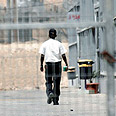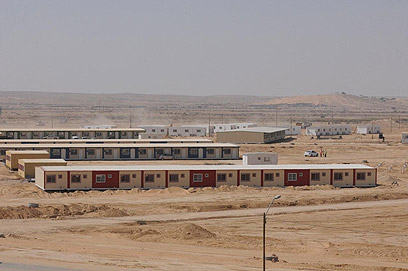
Infiltrators petition High Court
צילום: אליעד לוי
High Court: State must explain infiltration law
Judges to issue order nisi instructing State to explain why it is not rescinding infiltration prevention law which allows state to detain illegal infiltrators indefinitely
The High Court of Justice announced Tuesday that it intends to issue an order nisi instructing the State to explain why it is not rescinding the infiltration prevention law. The law allows the state to detain foreigners entering Israel via Sinai for a period of three or more years even if they are not up for deportation.
The order will be issued as part of a petition filed by Sudanese and Eritrean citizens and human rights groups who claim the law violates international and Israeli law.
Related stories:
- 1,000 African migrants leave Israel willingly
- Protest: South Tel Aviv conquered by refugees
- Foreigner suspected of raping elderly woman
Some 2,000 illegal infiltrators have been held in holding centers in the desert, including dozens of children since the law came into effect in June. A majority of the infiltrators being held are from Eritrea and Sudan – countries that due to international commitments Israel cannot send civilians back to for fear of the dangers they face there.

Holding facility in southern Israel (Photo: Herzl Yosef)
Among the petitioners against the law are four Eritreans and a one year old baby being held using the infiltration prevention law. One woman and the baby have since been released until a ruling is reached.
At the hearing the human rights groups accused the authorities of mincing words and using the term "holding facility" for a place where asylum seekers are being held, claiming it was a prison in every sense of the word.
It was further claimed that both Israeli and international law have judicial precedents which forbid the arrest of immigrants when they are not set to be deported and that the arrest of asylum seekers who escaped their countries will further harm their health and welfare.
They further claimed that deterring immigrants from coming to Israel does not justify arresting infiltrators. The petitioners noted that according to the State over half of the infiltrators have already filed for asylum but before their requests are even examined, the State claims they are not refugees.
Meanwhile, the State claimed that the law is not draconian, as claimed by the petitioners as dozens of those being held were released when it was justified to do so. The State further claimed that the petition is generalized and theoretical and that the petitioners skipped the administrative courts when they went directly to the High Court.
The High Court judges, including High Court President Asher Grunis and Justices Miriam Naor and Edna Arbel, criticized the State and wondered why the State failed to expand on its justification of the law.
The judges made it clear that it was their intent to issue an order nisi instructing the State to explain why the law was not rescinded.
Aviel Magnezi contributed to the report
- Receive Ynetnews updates directly to your desktop










